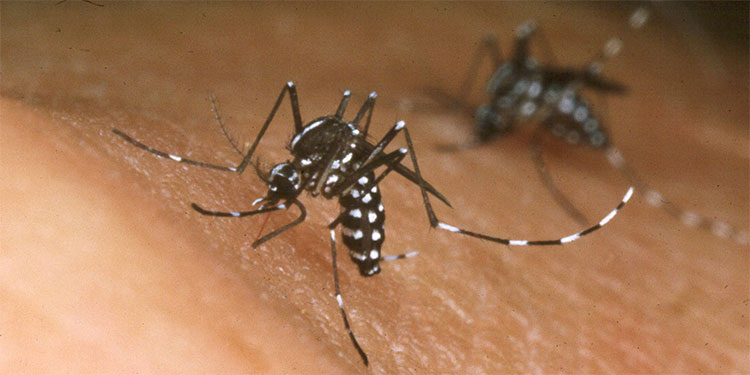The experiment destroyed most of the mosquitoes on the Chinese island
The team released male and female mosquitoes born naturally during the breeding season, successfully eliminating mosquito populations on the two islands.
An experiment on two islands in the southern province of Guangdong almost erases the population of mosquitoes , among the world's most powerful invasive mosquitoes, according to research published July 17 in Nature. . The experiment reduced 94% of female mosquitoes, the main source of transmission and transmission, and reduced 97% of those bitten by mosquitoes.

Striped mosquitoes are difficult to destroy by conventional methods.(Photo: Wikipedia).
This is not the first time researchers have tried to reduce the number of mosquitoes around the world. In 2018, a group of scientists from the Royal College of London used genetic modification tools to make female mosquitoes infertile while male mosquitoes grew normally and continued to spread gene mutations.
Xi Zhiyong, a professor at the University of Michigan, a member of the research team, is a pioneer in this area. Operating a mosquito plant in southern China, Xi used to try for sterile male mosquitoes to mate with normal female mosquitoes. " We create good mosquitoes to fight bad mosquitoes , " Xi said in 2016.
In the new study, Xi and colleagues sought to cut down on the number of mosquitoes by limiting the fertility of both male and female mosquitoes. Female mosquitoes are infertile when exposed to low radioactivity while male mosquitoes are infected with popcorn bacteria, then both are released naturally at the peak of the breeding season in 2016 and 2017 on two islands. island near Guangzhou city. The results were so successful that the experiment almost completely eradicated the female population of both islands.
Peter Armbruster, mosquito ecologist, said that this is one of the most successful mosquito reduction experiments ever. Midges are particularly difficult to kill with conventional quantitative controls such as pesticides and removal of stagnant water where mosquitoes lay eggs. This mosquito is described as highly invasive and spread from Asia to almost every continent for more than 40 years.
Mosquitoes pose many threats to human health. The World Health Organization (WHO) ranks mosquitoes in the world's most deadly animals due to their ability to transmit dangerous diseases such as dengue fever and malaria. Guangzhou, a populous and tropical metropolis, has about 37,350 people with dengue during the 2014 outbreak.
- Khanh Hoa released ... mosquitoes to the island to raise
- Interesting findings about mosquitoes
- Mosquitoes evolved to threaten wildlife on Galapagos Island
- 10 interesting things about mosquitoes
- Why do humans not erase mosquitoes?
- Discover 4 mosquitoes of the size of mosquitoes
- Why do mosquitoes love to burn humans?
- Change the sex of the mosquito
- 'Eat - wear - stay' helps you kill mosquitoes thoroughly
- Why are mosquitoes sucking blood from HIV, mosquitoes not sick?
- Mosquitoes' mosquitoes to block malaria
- How did Easter Island decline?
 Why do potatoes have eyes?
Why do potatoes have eyes? 'Tragedy' the world's largest carnivorous life: Death becomes ... public toilet
'Tragedy' the world's largest carnivorous life: Death becomes ... public toilet Tomatoes were once considered 'poisonous' for 200 years
Tomatoes were once considered 'poisonous' for 200 years Detecting microscopic parasites on human face
Detecting microscopic parasites on human face